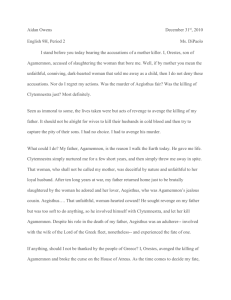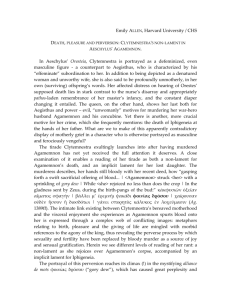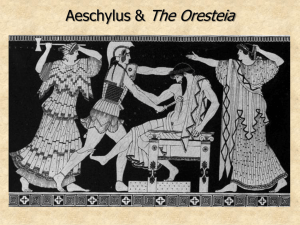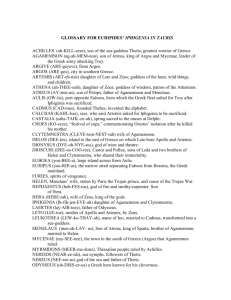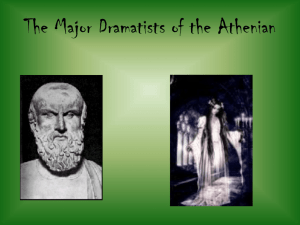In Defense of Clytemnestra by Twila Grim
advertisement
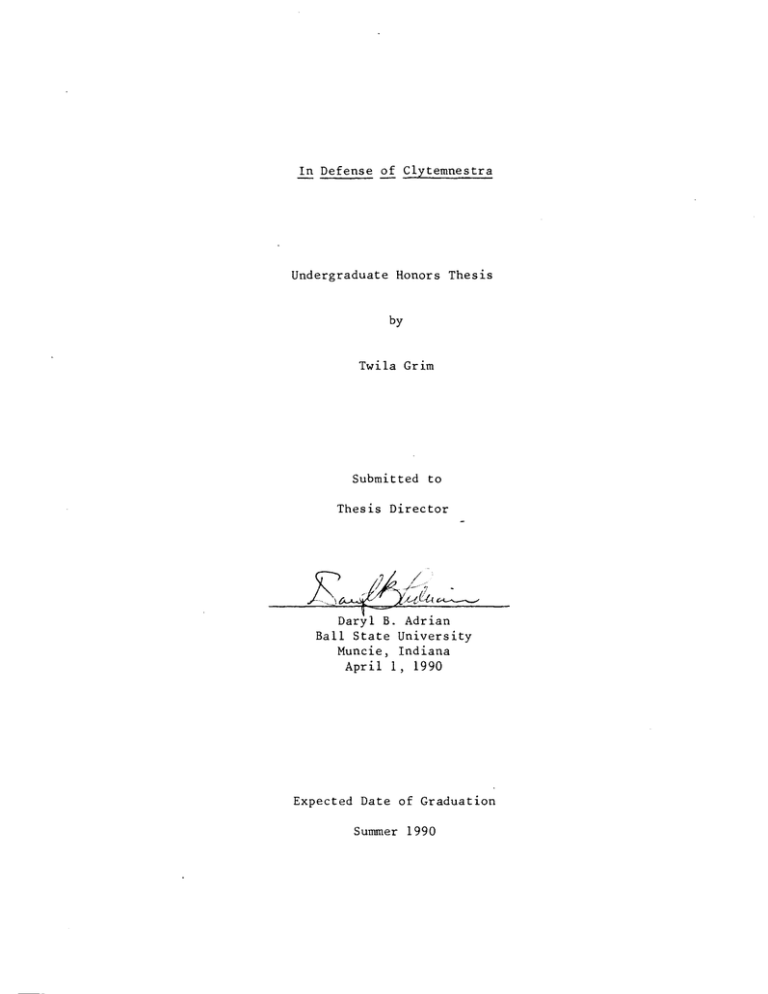
In Defense of Clytemnestra Undergraduate Honors Thesis by Twila Grim Submitted to Thesis Director Daryl B. Adrian Ball State University Muncie, Indiana April 1, 1990 Expected Date of Graduation Summer 1990 J T/ In Defense of Clytemnestra Literary scholars and critics have long regarded the Oresteia by Aeschylus as the foundation for our current legal system. This foundation is based on the acceptance that Clytemnestra, the wife and murderess of Agamemnon, was revengefully and justly murdered by her own son, Orestes, for her transgression against Agamemnon. In addition, college textbooks usuatly uphold and promote the premise that this ancient Greek trilogy is a valid model for justice as well. Mark Morford and Robert Lenardon in Classical Mythology attempt to establish the "justice" theory and innocence of Orestes by relying on the notion of transcendental involvement: Orestes acted with piety in avenging his father's death; his guilt is a later -- if more humane indeed, it ~s interpretation; illogical, for it ignores the fact that Apollo had ordered him to murder Clytemnestra. It was the genius, of Aeshcylus that transformed the primitive legend and in place of the ancient doctrine of blood-guilt and vengeance substituted for Reason and Law. (321) Oscar G. Brockett, in History of the Theatre, suggests that the Oresteia ~s the basis for "the evolution of the concept of justice, with the impersonal power of the state eventually replacing personal revenge, which up to the 2 final play (Eumenides) creates an endless chain of private guilt and punishmen t. II . ( 21) . Literary critics Brian Wilke and James Hurt, in their textbook Literature of the Western World, Vol. 1, also argue that justice is served Clytemnestra was justly murdered. and that In their preface to the Oresteia, they affirm: Within the plays themselves, the chain of violence is extended by two further acts: the murder of Agamemnon by his wife Clytemnestra, and the successful conspiracy of their children, Orestes and Electra, to kill their mother in the cause of justice. (465) Despite such declarations, there has been a recent shift Ln the critical examination of Clytemnestra's actions and her alleged guilt. Some very enlightening feminist writers, in particular, support Clytemnestra's innocence and claim that justice, in fact, had very little to do with the mLsogynous Oresteia. These more current critics attempt to justify some of Clytemnestra's actions based upon the conditions under which she (and all women) lived. It is quite evident that, in general, women in antiquity did not fare well. From Hesiod's blaming Pandora for all of the evils of the world, to the Hebrew writers' placing all of the world's troubles on Eve, women are presented Ln a guilty, blameful, and derogatory fashion. Sarah Pomeroy, author of Goddesses, Whores, Wives and Slaves, writes that the first written hostility towards women was when Homer exhibited a clearly misogynous attitude in the Odyssey. When Odysseus visited 3 Agamemnon in the underworld, Agamemnon spoke of his own murder by Clytemnestra and then added that her actions extended to "all women yet to come, even those few who may be virtuous" (199). Thus, all women throughout future history are alleged to be evil and husband murderers. To try to understand men's hostility towards women, Pomeroy analyzes the possible causes of men's almost universal hatred of women and concludes that "mis9gyny was born from the fear of women" (97). men in antiquity feared women? If that statement is correct, why was it that Perhaps the answer lies in the fact that in antiquity, women were considered to be a man's property at best, and his slave at worst, though the two may be difficult to differentiate. For example, Homer irnthe Iliad re- peatedly objectifies women as he refers to them as "prizes" and "booty" (15). Even the chaste Penelope of the Odyssey is said to be the prize for the contest of the suitors. And when Odysseus returns from the Trojan War, he not only murders all of the suitors, he also murders the slave women who had consorted with them, even though they, as slave women, really could not have refused the suitors. Fortunately, Penelope remained celibate and faithful to her husband throughout the twenty years (!) of his absence, despite the fact that he hadnot, or she too would have been beaten or even killed by Odysseus. By objectifying and subjugating women to the point that their very lives are granted or denied sole}y on the discretion of oppressive men, it might be a fair assumption that fear of an ill-treated and enslaved population (women) could be the foundation for a misogynous society. In addition to the general dislikes of women, Clytemnestra was also 4 despised for more specific reasons. Before the murder of Agamemnon, the initial complaint against her was that she had masculine qualities and would not be subjugated by men. ro", tr·f \ As ~t observes, "womanly behavior was char- acterized then, as now, by submissions and modesty" (98). Clytemnestra, however, was certainly a queen who would not submit to a man's rule. Clytemnestra's inherent and distasteful traits are criticized throughout the play by a variety of people. She is first introduced in the Agamemnon by the watcluan who bitterly complains, "So, she commands, full of her high hopes.! That woman -- she maneuvers like a man" (469). Attacks upon her aggressiveness, masculine qualities, and feminine gender are abundant. From all directions, these remarks are intended to be contemptuous, insulting, and disparaging towards her and women in general. Note for example the following: Chorus: Just like a woman to fill with thanks before the truth is clear. So gullible. Their stories spread like wildfire, They fly fast and die faster; rumors voiced by women come to nothing (481-82) Cassandra: What to call that . monster of Greece, and bring my quary down? Viper coiling back and forth? Some sea-witch. (505) Chorus: Woman made him suffer. Woman struck him down. (513) 5 But mere rebellion and social unacceptability were certainly not the sole reasons for the contempt the male Greek audienc~ since then, have displayed towards Clytemnestra. as well as critics Her real treachery lies in the fact that she had the audacity to murder her husband. The motive for this murder, on the other hand, is eclipsed throughout the trilogy, and by the end of the Oresteia, the part that deals with justice completely and entirely ignored. important. is Clytemnestra's motive, however, ~s keenly After all, Agamemnon had first misled and then murdered their daughter Iphigenia, sending for her on the pretense that she was to marry Achilles, when he instead offered her as a sacrifice to the gods in order to appease them for his own outrageous and excessive hubris at Troy. The chorus ~n the Iliad effectively relate the chilling destruction at Troy as they describe Agamemnon and Menaleus as: The kings of birds to kings of the b~eaking prows, one black, skimmed the palace spearhand right and swooping lower, all could see, plunged their claws in a hare, a mother bursting with unborn young -- the babies spilling, quick spurts of blood -- cut off the race just dashing into life! (118-124) As Froma Zeitlin says in her essa~ The Dynamics ~ Misogyny in the Oresteia, "the queen's primary motive was maternal vengeance for her child, Iphigenia; her second one was the sexual alliance she contracted with Aegisthus in her husband's absence" (167). 6 Indeed, the acquisition and flaunting of a lover were despicable acts for a woman to be engaged in, and Clytemnestra had taken a lover. It is interesting to observe that much emphasis is placed on the fact that Clytemnestra had a lover, but Agamemnon's sexual liasonswerematter-of-fact and totally glo"Ssed over. In fact, Agamemnon was a notorious womanizer. His immature philandering is profoundly acknowledg!d by the first word in the Iliad which ~s "Anger" (11). ~n the Trojan War because Agamemnon has claimed Khryses, a for his booty. The anger is present because Achilles has stopped fighting The priest appeals his army until the woman pries~s daughter, to the gods to punish Agamemnon and is returned. In a display of childishness, Agamemnon returns Kbr.yses, but then claims the woman who had been given to Achilles. Consequently, the entire war was threatened due to Agamemnon's uncontrollable lust and greed. At the end of the Trojan War, Agamemnon has another war prize; the prophetess Cassandra. In Aeschylus' Agamemnon, Agamemnon instructs his wife Clytemnestra to "Escort this stranger in, be gentle./ compassion" (496). Conquer with Wright contends that this action was the final blow in that Agamemnon fully expected his wife to accept Cassandra as his new bed partner with both women living under the same roof. be interpreted The play may also to indicate that with this final blow, Clytemnestra actually feared she might have a break with her sanity: "When the root lives on / the new leaves come back, / spreading a dense shroud of shade across the house / to thwart the Dog Star's Fury" (496). If the murder of Agamemnon was pre- medifated, then perhaps the murder of Cassandra was more of a crime of passion. 7 In an effort to justify Clytemnestra's murder of her husband, Agamemnon, author Riane Eisler in her book The Chalice and the Blade agrees that, addition to acting out of grief and revenge for her child ~n and disgust for her husband, Clytemnestra also acted in accordance to her station in life as a matrilineal society leader: She (Clytemnestra) makes it clear that this is done not merely out of personal grief and hatred, but in her social role as the head of her clan, responsible for avenging the shedding of kindred blood. In short, she ~s acting within the norms of a matrilinial society, in which as queen it ~s her duty to see that justice is done (79). According to Eisler, Clytemnestra was not only personally justified in avenging the death of Iphigenia, she was also acting very well within the law of the land i.e. the matrilineal society of which she was queen. Justice is said to be achieved in the final play of the Oresteia, the Eumenides, when Orestes is declared not guilty for the premeditated vengeance murder of Clytemnestra. The verdict ~s based upon Apollo's statement that" the mother is no part of which nurse of the new planted seed that grows" (78). ~s called her chi ld, only This is a blatant attempt to diminish and again objectify the humanity of women Eisler counters that this entire premise is absurd and also omits any mention of Iphigenia. Eisler argues, "if a mighty creature like Clytemnestra with the provocation she has in the murder of her child, Iphigenia, has not the right to take revenge, what woman has?" (8D). 8 In regards to women killing men for any reason, Wright comments that 1n Euripides' version of the trial there is a line spoken by Orestes that asks, "If women are to be allowed to shed male blood, then we men had better commit suicide at once" (74). And Wright addresses this line by asking, "IS a woman ever justified in killing her husband?~ This is a pertinent question to be asked in a society where all women are enslaved. (74) It appears that many more current critics agree that under qualifying conditions, some women may, in fact, be very justified in killing their husbands, and without a doubt, Clytemnestra is one of those women. Wright suggests, go to her. As Even when Clytemnestra kills Agamemnon, our sympathies Agamemnon's intolerant callousness and pride are the reasons he killed his daughter. (75). better person of the pair: Wright continues, "Clytemnestra 1S really the that she is naturally born to rule, and that her subjecting to a man would be against the laws of nature." (75) The misogynous message of the Oresteia, through the supposed guilt of Clytemnestra, is quite clear kill mothe~ Fathers may kill daughters, and sons may but any crimes committed by women against men are absolutely unacceptable under any conditions. Eisler concludes that while the standard scholarly interpretation has been that it (Oresteia) was intended to explain the origins of Greek Areopagus, or court of h6micide, the real purpose of the Oresteia was to exhibit, "through the lesson of what happened to this uppity woman, even with just cause, all women are effectively restrained from even entertaining the idea of rebellious acts" (80). 9 Froma Zeitlin concludes that the Oresteia actually had nothing to do with the concept of justice. Instead she contends that the purpose of the Oresteia actually was to establish a dominant precedence on three levels. On a divine level, the Olympic gods, dominated by a male Zeus, overpowered the Chthonic order, dominated by fertility goddesses and female entities such as the Eumenides. over the barbarian Trojans. On a political level, Greeks exhibited power And, on a social level, men would dominate women. In summary, I conclude that Wright, Eisler, and Zeitlin are all correct. Through fear, intimidation, surpress~on, social inequality, attacks on self- esteem, and physical abuse, women have been and continue to be down-graded and devalued which deprives them of their equal place as human beings. While the classics such as "The Agamemnon" are certainly invaluable pieces of work, it is wrong for critics to condone and elevate their message to be truths. I certainly agree that this play is a brilliant piece of fiction, but I also agree that this play promotes misogyny and does not address the concept of justice at all. Works Cited Aeschylus. The Oresteia. Trans. Robert Fagles. Literature of the Western World. vol. 1, eds. Brian Wilkie and James Hurt. Brockett, Oscar G. History of the Theatre. 5th ed. New York: Boston: Macmillan, 1984. Allyan and Bacon, 1987. Eisler, Riane. The Chalice and the Blade. San Francisco: Harper and Row, 1987. Homer. Iliad. Trans. Robert Fitzgerald. Homer. Odyssey. New York: Literature of the Western World. Trans. Robert Fitzgerald. vol 1, eds. Brian Wilkie and James Hurt. Morford, Mark and Robert Lenardon. Macmillan, 1984. New York: Classical Mythology. Macmillan, 1984. 3rd ed. New York: Longman Press, 1985. Pomeroy, Sarah B. Goddesses, Whores, Wives and Slaves. New York: Schoken, 1975. Wright, F. A. Feminism 1n Greek Literature. New York: Zeitlin, Froma I. "The Dynamics of Misogyny in the Oresteia." Ancient World: Sullivan. The Arethusa Papers. Albany: 1'1"", Kenniket Press, l~ Women in the eds. JOhn Peradotto and J. P. State University of New York Press, 1984.
